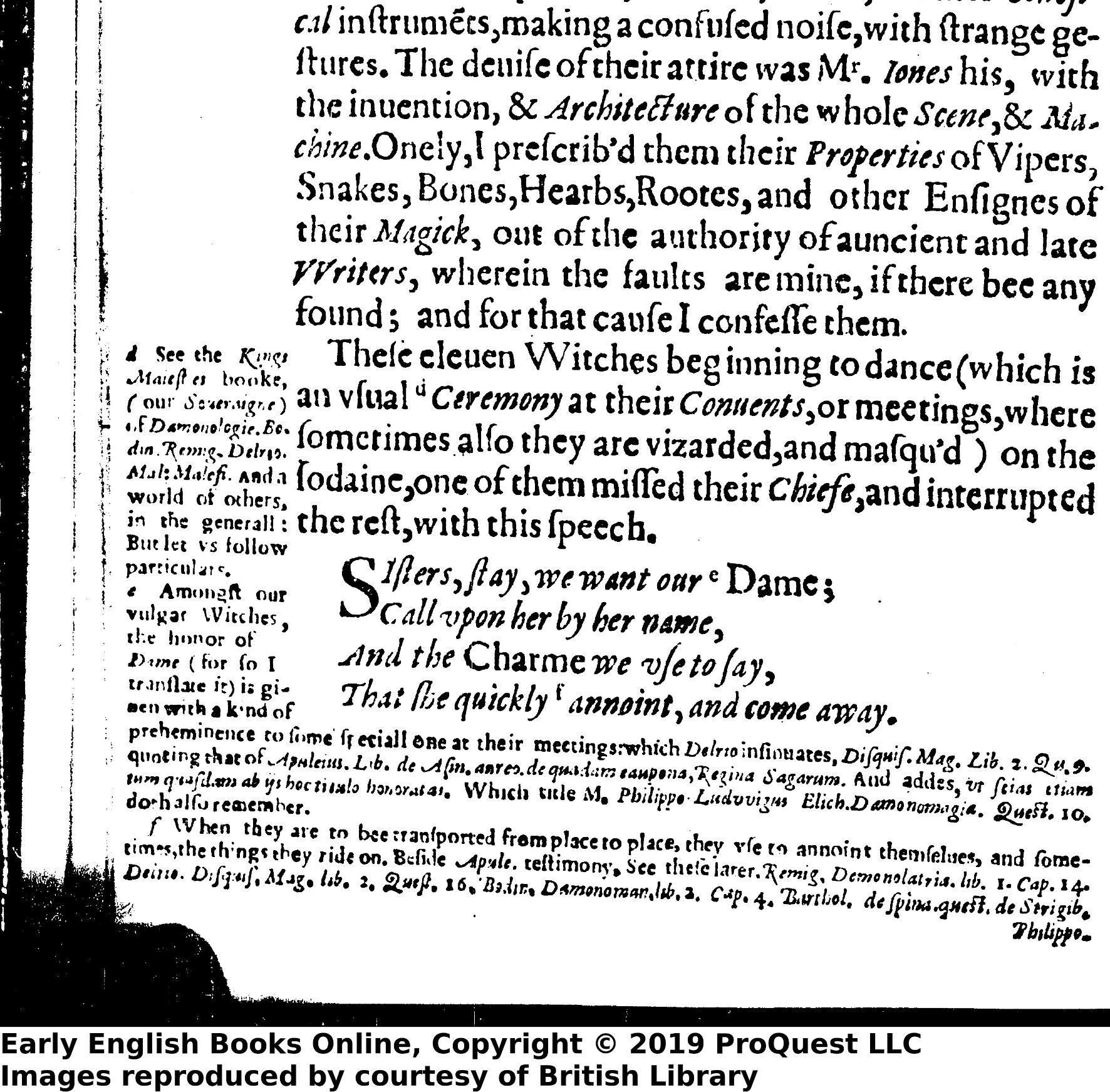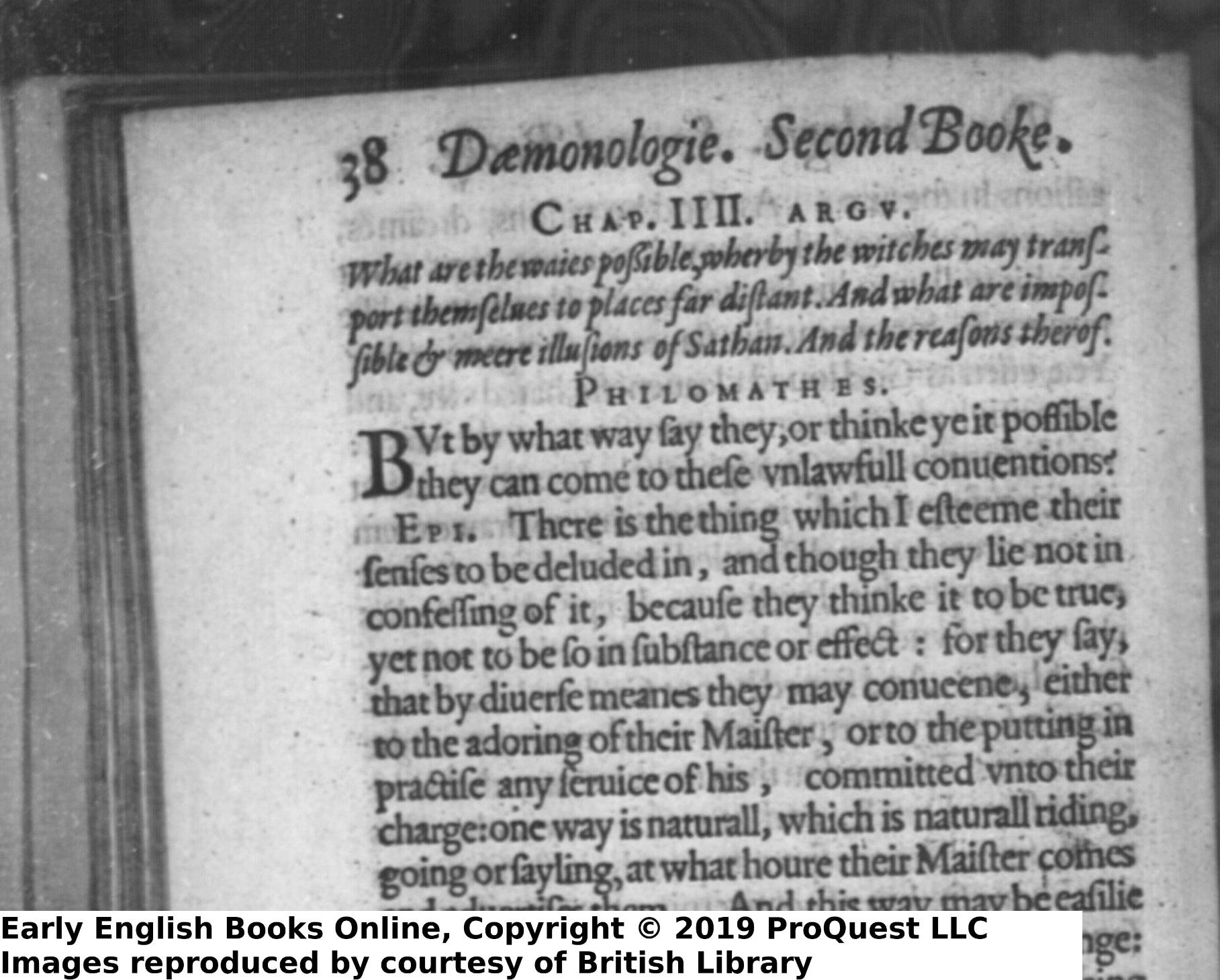Another seventeenth-century word sometimes used to describe a gathering of witches is conventicle. Here are five early matches of that term in association with witches that searches of Early English Books Online return.
From Ralph Knevet, Stratiōtikon. Or A discourse of militarie discipline (1628):
For from beneath I heard an hideous [s]ound, / As i[f] some Earthquake dire had cle[f]t the ground / Or Hell her selfe approach to make one, / In their mischieuous consultation. / So Neptune scourged with the Northwind rores: / Such is the clangour, of a thousand ores / Falling at once vpon the surging waue: / The Witches in their conuenticles haue / Such Musicke, as was this for t'was the noyse / Of the infernall pow'rs, that did reioyce, / To see that Hellish-plot contriu'd, and wrought, / That might bring all the world againe to nought
From a 1629 translation of Ch. de Fonseca, "The XXIII Sermon, Upon the Fryday After the Third Sonday in Lent," in Deuout contemplations expressed in two and fortie sermons vpon all ye quadragesimall Gospells:
As in the place where sinners meet, as in your Conuenticles of Heretickes, and Witches, the Deuill comes amongst them, offering them imaginarie fountaines of delights: So, in holy places thou shalt presently meet with God, who will offer thee fountaines of liuing waters, &c. Tertullian treating of the Amphi∣theaters where men went in to kill one another, sayd, Tot daemones, quot, That there were as many Deuils there, as there were Men. And a woman that was a Christian comming from these sports, the Deuill entred into her. And beeing asked how he durst doe so to a seruant of our Sauior Christ, made answer, I found her within the limits of my Iurisdiction.
From Thomas Heywood, The hierarchie of the blessed angells Their names, orders and offices the fall of Lucifer with his angells (1635):
In briefe, all those operations, Conjurations, Incantations, Abjurations, Murmurations; all those Conuenticles and nightly assemblies in places desart and remote, of Witches, Sorcerers, Magitions, Conjurers, and such like, haue the great Diuell himselfe for their Authour and Abettor.
From H. F., A true and exact relation of the severall informations, examinations, and confessions of the late witches, arraigned and executed in the county of Essex (1645):
Take one in∣stance of the jugglings and illusions ef the Devill above all the rest, which doth most palpably detect him herein, is a History related by Johannes Baptista Porta, in his second book, de Magia naturali; hee there witnesseth, that upon the Devils suggestion, a Witch believed firmly and perswaded her self, that all the night shee had rid in the aire, over divers great mountaines, and met in conventicles with other Witches, when the same night, the mentioned Author himself, with others that watched her and saw her all that imagined time of her transvection in the aire, to be within her chamber profoundly sleeping; ...
From Henry More, An antidote against atheisme, or, An appeal to the natural faculties of the minde of man, whether there be not a God (1652):
CHAP. VII. The nocturnall Conventicles of Witches; that they have often dissolved & disappeared at the naming of the Name of God or Jesus Christ; and that the party thus speaking has found himself alone in the fields many miles from home. The Dancing of Men, Women and cloven-footed Satyres at mid-day; John Michaell piping from the bough of an Oake, &c.
...
I will only adde a Story or two out of Remigius concerning these Conventicles of Witches, and then I will proceed to some other proofs.
John of Hembach was carried by his Mother being a Witch to one of these Conventicles, and because he had learnt to play on the Pipe, was commanded by her to exercise his faculty & to get up into a Tree, that they might the better hear his Musick.
The OED notes that conventicle was often used in a neutral sense ("a meeting secular or religious") from the fourteenth century forward. However, it also notes early use of the word in less benign senses:
3. A meeting or assembly of a clandestine, irregular, or illegal character, or considered to have sinister purpose or tendency. [Citations from as early as 1383 omitted.]
4. A religious meeting or assembly of a private, clandestine, or illegal kind ; a meeting for exercise of religion otherwise than as sanctioned by the law [Relevant citation from 1526:] He sente a flode after her, by the which is vnderstanded the conuentycle of heretykes.
That this sense of the term was in contemporaneous usage in 1608 is evident from this instance from Thomas Hutton, Reasons for refusal of subscription to the booke of common praier vnder the hands of certaine ministers of Devon, and Cornwall word for word as they were exhibited by them to the Right Reverend Father in God William Coton Doctor of Divinitie L. Bishop of Exceter (1605):
For conclusion of this questiō. First private signifieth, that which is done privily in a clanculary manner by stealth, without authority contrary to Gods word by Jesuits, seminary Priests, schismatical teachers, and the like, in which sort, if any of our brethren meane, they proue nothing against vs, for our church generally condēneth such conventicles, whither of hereticks, or schismaticks.
Although people today may suppose that the primary objection to witches four centuries ago related to their ability to perform uncanny acts of wickedness that harmed others, contemporaneous hostility gave considerable place to witches' religious deviance: they covenanted with and worshiped the Devil rather than God, and in that sense were heretical as well as being dangerously acquainted with curses and other magical powers. Viewed in this light, it seems no great conceptual leap to go from conventicles of heretics in 1605 to conventicles of witches in 1628.


